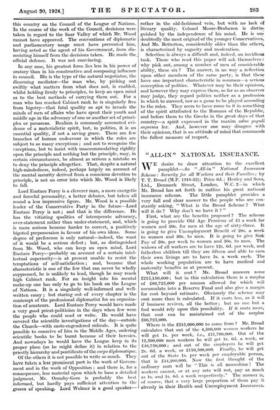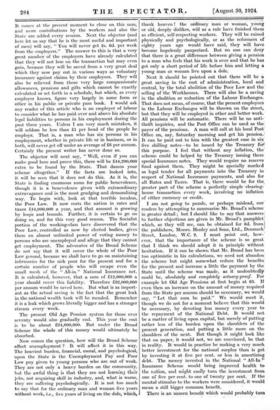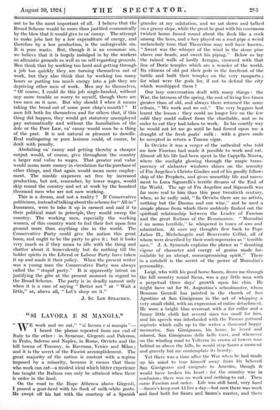" ALL-IN " NATIONAL INSURANCE.
WE desire to draw attention to the excellent pamphlet—An " All-in " National Insuran64 Scheme: Security for all Workers and their Families; by T. T. Broad (M.P. 1918-22); Price 6d. ; Henley and Sons, Ltd., Denmark Street, London, W.C. 2—in which Mr. Broad has set forth in outline his great national insurance scheme. The little pamphlet provides a very full and clear answer to the people who are con- stantly asking, "What is the Broad Scheme ? What will it do ? Why don't we have it ? "
First, what are the benefits proposed ? The scheme is going to provide Old Age Pensions of a week for women and 30s. for men at the age of sixty-three. It is going to give Unemployment Benefit of 20s. a week to women and 30s. to men. It is going to give Sic Pay of 20s. per week to women and 30s. to men. The widows of all workers are to have 12s. 6d. per week, and fatherless children till they are fifteen and able to earn their own livings are to have 5s. a week each. The whole working population are to have medical and maternity benefits as at present.
What will it cost ? Mr. Broad answers some £215,150,000; but in this calculation there is a surplus of £66,725,000 per annum allowed for which will accumulate into a Reserve Fund and also give a margin for cost beyond estimate. Obviously the scheme may cost more than is calculated. If it costs less, as it will if business revives, all the better ; but no one but a fool would rely upon this possibility. If it costs more, that cost can be maintained out of the surplus £66,725,000.
Where is the £215,000,000 to come from ? Mr. Broad calculates that out of the 4,500,000 women workers he will get is. per week, i.e., £11,700,000. Out of the 12,500,000 men workers he will get is. 6d. a week, or £48,750,000; and out of the employers he will get 2s. 6d. a week, or £110,500,000. Finally, he will get out of the State Is. per week per employable person, that is 144,200,000. Now the first thought of the ordinary man will bc "This is all moonshine ! The workers cannot, or at any rate will not, pay as much as is. and Is. 6d. a week respectively." The answer is, of course, that a very large proportion of them pay it already in their Health and Unemployment Insurances. It comes at the present moment to close on this sum, and more contributions by the workers and also the .State are added every session. Next the objector (and here let us say that he is the most useful and important of men) will say, "You will never get 2s. 6d. per week from the employers." The answer to this is that a very • great number of the employers have already calculated that they will not lose on the transaction but may even gain, because they will be saved from a very great deal which they now pay out in various ways as voluntary insurance against claims by their employees. They will also be relieved from those very large compassionate allowances, pensions and gifts which cannot be exactly calculated or set forth in a schedule, but which, as every employer knows, figure very largely in some form or other in his public or private pass book. I would ask any reader of this article who is an employer of labour to consider what he has paid over and above his absolute legal liabilities to persons in his employment during the past three years. Unless I am very much mistaken, it will seldom be less than El per head of the people he employs. .That is, a man who has six persons in his employment, whether in private life or in business, or in both, will never get off under an average of £6 per annum. Certainly the present writer has never done so.
The objector will next say, "Well, even if you can make good here and prove this, there will be 244,200,000 extra to be found by the State. That damns your scheme altogether." If the facts are looked into, it will be seen that it does not do this. As it is, the State is finding enormous sums for public benevolence, though it is a benevolence given with extraordinary extravagance and in the most grudging and demoralizing way. To begin with, look at that terrible incubus, the Poor Law. It now costs the nation in rates and taxes £44,000,000 a year, and that amount is growing by leaps and bounds. Further, it is certain to go on doing so, and for this very good reason. The Socialist portion of the working-class have discovered that the Poor Law, controlled as now by elected bodies, gives them an almost unlimited power of voting money to persons who are unemployed and allege that they cannot get employment. The advocates of the Broad Scheme do not say that it will cover the whole of the Poor Law ground, because we shall have to go on maintaining infirmaries for the sick poor for the present and for a certain number of people who will escape even the small mesh of the " All-in " National Insurance net. It is calculated, however, that a sum of 112,000,000 a year should cover this liability. Therefore £32,000,000 per annum would be saved here. But what is as import- ant as the actual saving is the fact that the great leak in the national wealth tank will be mended. Remember it is a leak which grows literally bigger and has a stronger stream every week.
The present Old Age Pension system for those over seventy would, also gradually end. This year the cost is to be about £24,000,000. But under the Broad Scheme the whole of this money would ultimately be absorbed.
Now comes the question, how will the Broad Scheme affect unemployment ? It will affect it in this way. The heaviest burden, financial, moral, and psychological, upon the State is the Unemployment Pay and Poor Law pay given to young persons who are out of work. They are not only a heavy burden on the community, but the awful thing is that they are not learning their jobs, not acquiring skill in industry, and, what is worse, they are suffering psychologically. It is not too much to say that for the ordinary man and woman five years without work, i.e., five years of living on the dole, which, thank heaven ! the orainary man or woman, young or old, deeply dislikes, will as a rule have finished them as efficient, self-respecting workers. They will be ruined physically and psychologically, or as the reformers of eighty years ago would have said, they will have become hopelessly pauperized. But no one can deny that there is a great difference between giving a pension to a man who feels that his work is over and that he has got only a short period of life before him and letting a young man or woman live upon a dole.
Next it should be pointed out that there will be a great saving in the cost of administration, local and central, by the total abolition of the Poor Law and the' selling of the Workhouses. There will also be a saving in the abolition or reduction of the Labour Exchanges. That does not mean, of course, that the present employees in the Labour Exchanges will be thrown on the street, but that they will be employed in other and better work.' All pensions will be automatic. There will be no anti- thrift inquiries, and the Post Office can be used as the payer of the pensions. A man will call at his local Post! Office on, say, Saturday morning and get his pension.' It can be paid out to him with the greatest ease in six five shilling notes—to be issued by the Treasury foit this purpose. I feel that without any inflation, the scheme could be helped by the Treasury isSuing these' special Insurance notes. They would require no reserve fund against them. They might be specially marked as legal tender for all payments into the Treasury in respect of National Insurance payments, and also for all Rates and Taxes. That is, there would be for the greater part of the scheme a perfectly simple clearing- house transaction every week, involving no hiflatiori of either currency or credit.
I am not going to puzzle, or perhaps mislead, our readers by attempting to summarize Mr. Broad's scheme in greater detail ; but I should like to say that answers to further objections are given in Mr. Broad's pamphlet which, as they will see, can be obtained for 6d. from the publishers, Messrs. Henley and Sons, Ltd.., Denmark Street, London, W.C. 2. I must point out, how- ever, that the importance of the scheme is so great that I think we should adopt it in principle without' hesitation. If it can be shown that Mr. Broad has been too optimistic in his calculations, we need not abandon' the scheme but might somewhat reduce the benefits for the present and increase a little the payment by the State until the scheme was made, as it undoubtedly could be, absolutely and completely actuary-proof For example let Old Age Pensions at first begin at 65. If even then an increase on the amount of money required from the State per annum should be necessary, we would say, "Let that sum be paid." We would meet it, though we do not for a moment believe that this would be necessary, by devoting less money every year to the repayment of the National Debt. It would not be a matter of living upon capital, but merely of putting rather less of the burden upon the shoulders of the present generation, and putting a little more on the shoulders of the next. But though it might look like that on paper, it would not, we are convinced, be that in reality. It would in practice be making a very much better investment for the national surplus than is got by investing it at five per cent, or less in amortizing debt. The money invested in the National "All-In" Insurance Scheme would bring improved health to the nation, and might easily turn the investment from one of five per cent. to one of twenty per cent. If the mental stimulus to the workers were considered, it would mean a still bigger common benefit. • There is an unseen benefit which would probably turn Out to be the most important of all. I believe that the Broad Scheme would be more than justified economically by the blow that it would give to ea' canny. The attempt to make jobs last by a low expenditure of energy, and therefore by a low production, is the unforgivable sin. It is pure waste, But, though it is an economic sin, we believe that it is largely indulged in by the workers on altruistic grounds as well as on self-regarding grounds. Men think that by working too hard and getting through a job too quickly. they are turning themselves out of work, but they also think that by working too many hours or putting too much energy into a job they are depriving other men of work. Men say to themselves, "Of course, I could do this job single-handed, without any more trouble or worry to myself, though there are two men on it now. But why should I when it means taking the bread out of some poor chap's mouth?" If men felt both for themselves and for others that, if this thing did happen, they would get statutory unemployed pay automatically and without the humiliation of the dole or the Poor Law, ca' canny would soon be a thing of the past. It is not natural or pleasant to dawdle. Real malingering or pure laziness could, of course, be dealt with penally.
Abolishing ca' canny and getting thereby a cheaper output would, of course, give throughout the country a larger real value to wages. That greater real value would mean more money in circulation for the purchase of other things, and that again would mean more employ- ment. The nimble sixpences set free by increased production, but not, remember, by lower wages, would skip round the country and set at work by the hundred ;thousand men who are not now working.
This is a dream, and not a reality ? If Conservative politicians, .instead of talking about the scheme for" All-in" Insurance, were to take it up in earnest and nail it to their political mast in principle, they would sweep the country. The working men, especially the working women, of this country want to feel their feet upon firm ground more than anything else in the world. The Conservative Party could give the nation this great boon, and ought to be the party to give it ; but it looks ;very much as if they mean to idle with the thing and chatter about it benevolently but do nothing till the bolder spirits in the Liberal or Labour Party have taken it up and made it their policy. When the present writer was a young man the Conservative Party was always 'called the "stupid party." It is apparently intent on justifying the gibe at the present moment in regard to the Broad Scheme. The party is in deadly earnest only when it is a case of saying "Better not" or "Wait a little," or, above all, "Let's sleep on it."
J. Sr. LOE STRACHEY.




































 Previous page
Previous page